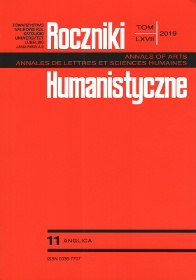Education: Its Ethical Dimension and Metaphorical Visualisation in John Henry Newman’s The Idea of a University (1852)
Education: Its Ethical Dimension and Metaphorical Visualisation in John Henry Newman’s The Idea of a University (1852)
Author(s): Adam WarcholSubject(s): Language and Literature Studies, Studies of Literature, British Literature
Published by: Towarzystwo Naukowe KUL & Katolicki Uniwersytet Lubelski Jana Pawła II
Keywords: John Henry Newman; university education; ethics; the theory of conceptual metaphor; networks of implicational metaphors
Summary/Abstract: Almost two centuries ago, in his book The Idea of a University, Cardinal John Henry Newman (1801–1890) formulated his vision of university education, given in the light of faith and catholic ethics. This paper attempts to frame Newman’s view of a university using the theory of conceptual metaphor as initially proposed by Lakoff and Johnson in their book Metaphors We Live By (cf. also Lakoff & Johnson 1999; Lakoff 1987, 1993; and Kövecses 2015; among others). In particular, the paper seeks to establish the main networks of implicational metaphors which, we believe, structure Newman’s idea of a university. Principally, there are three main networks of conceptual metaphors underlying our understanding of Newman’s vision of a university: life is a building; life is a living organism; and life is a journey. The paper deals only with the first network in greater detail. In the main metaphor life is a building, other metaphors referring to university are evoked, for example university is a place, field, shelter, an integrated system, a nation and a combination of colours; knowledge is a plant, a reward, good, freedom, power, treasure, art and beauty.
Journal: Roczniki Humanistyczne
- Issue Year: 67/2019
- Issue No: 11
- Page Range: 61-73
- Page Count: 13
- Language: English

